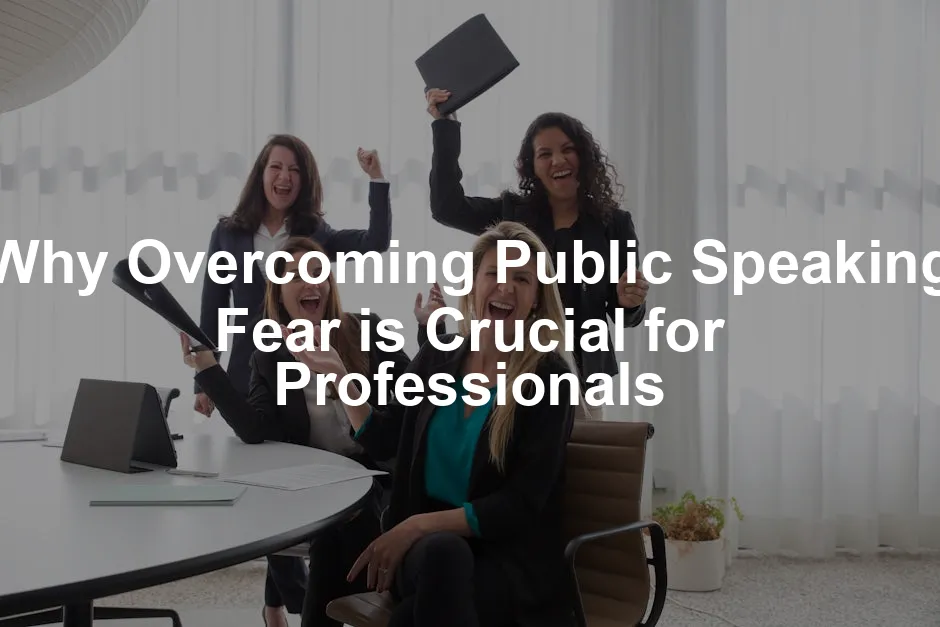
Why Overcoming Public Speaking Fear is Crucial for Professionals
Introduction
Ah, public speaking—the only activity that can make even the bravest souls feel like they just stepped into a lion’s den. A staggering 75% of us harbor some level of fear when it comes to addressing a crowd. This phobia, known as glossophobia, often lurks behind the scenes, quietly sabotaging careers and opportunities. Picture this: it’s your big day. You’re set to present your groundbreaking ideas to a room full of executives. You walk up to the podium, and suddenly, the words evaporate from your mind faster than ice cream on a hot summer day.
Now, if you haven’t experienced this scenario, you’ve probably heard someone recount a similar tale. Just ask anyone who’s ever stuttered through their first speech or mispronounced a key term while under the watchful gaze of a thousand eyes. It’s a rite of passage many of us share, and it often leads to a swift retreat into the safety of silence, avoiding any public speaking engagements like the plague. But here’s the kicker: overcoming this fear is not just about personal triumph; it’s a crucial stepping stone toward professional growth. Mastering the art of public speaking can open doors that may otherwise remain firmly shut. Not only does it enhance your communication skills, but it also boosts your confidence and credibility in your field. The ability to articulate your thoughts clearly can become your best asset, making you the go-to person for presentations, meetings, or even spontaneous speeches at events. So, let’s break it down. Why should professionals care about overcoming public speaking fear? Well, aside from the obvious benefits of not turning into a human statue at the next company meeting, conquering this fear can lead to enhanced career prospects, improved networking opportunities, and a chance to truly express oneself. It’s time to transform fear into fuel. Embrace the stage, and you might just find that the spotlight is not such a scary place after all. If you’re looking for some great reading material to help you along the way, consider picking up “Talk Like TED: The 9 Public-Speaking Secrets of the World’s Top Minds”. It’s packed with insights that can elevate your speaking game to the next level!If you’re interested in understanding more about this fear, check out this article on why some people have a fear of public speaking (glossophobia).
Summary
Overcoming the fear of public speaking is not just a personal milestone; it’s a professional game changer. Let’s summarize why this is essential. First, public speaking skills are often linked to career advancement. Many promotions hinge on the ability to communicate effectively. Those who shy away from speaking opportunities may find themselves stuck on the sidelines, missing out on exciting projects and leadership roles.
Importance of Overcoming Public Speaking Fear
The Impact on Career Advancement
Effective communication skills can make or break your career. Want that promotion? Better polish those public speaking abilities! Many organizations prioritize communication when considering candidates for leadership roles. If you can’t convey your ideas clearly, you might find yourself stuck in the same position for years. A startling statistic reveals that nearly 45% of professionals admit their fear of public speaking has significantly impacted their career choices. Many avoid applying for leadership positions, fearing the spotlight during presentations. This self-imposed limitation often leads to stagnation. Those who embrace public speaking opportunities, on the other hand, often climb the career ladder faster. Moreover, strong communicators often radiate confidence. This confidence can sway hiring managers and promote rapid career growth. It’s not just about speaking well; it’s about being perceived as a leader. When you articulate your thoughts effectively, you become the go-to person in meetings, steering discussions and influencing decisions. To harness this confidence, consider using a Wireless Lapel Microphone. It ensures that your voice is heard loud and clear, no matter the audience size! Unfortunately, the fear of public speaking can keep talented individuals sidelined. When professionals avoid speaking opportunities, they miss out on chances to shine. Those who face this fear head-on often find themselves in roles they may have never thought possible.Enhancing Communication Skills
Public speaking isn’t just about delivering a speech; it’s about enhancing your overall communication skills. Engaging with an audience teaches clarity, persuasion, and engagement—all vital tools in your professional toolbox.
Boosting Confidence and Reducing Anxiety
The psychological benefits of overcoming public speaking fear are profound. For many, conquering this fear leads to a significant boost in self-esteem. When you stand in front of an audience and deliver a compelling presentation, you realize that your voice matters.
Techniques for Overcoming Public Speaking Fear
Preparation Strategies
Preparation is your best friend when facing public speaking fears. Knowing your topic inside and out can transform anxiety into confidence. Imagine walking into a room filled with curious faces, and instead of feeling like a deer caught in headlights, you feel like a knowledgeable sage ready to spill wisdom. First, thoroughly research your subject. The better you understand it, the less likely you’ll stumble over your words. Think of it as armor against fear. Next, consider your audience. Tailoring your content to their interests makes your message more engaging. Are they executives? Young professionals? Cater to their needs, and watch their eyes light up with interest.
Anxiety Management Techniques
Managing anxiety before and during public speaking engagements is crucial. Even the most seasoned speakers feel the jitters. So, let’s embrace some practical techniques to help you keep your cool. Start with deep breathing exercises. Inhale deeply through your nose, hold for a few seconds, then exhale slowly through your mouth. This simple act can significantly reduce anxiety. Try doing this a few times before you step on stage. To enhance this experience, consider using a Relaxation Essential Oil Blend to help calm your senses. Visualization is another powerful tool. Picture a successful presentation in your mind. Imagine yourself confidently addressing the audience, engaging them, and receiving applause. This positive imagery can shift your mindset from fear to excitement. Positive affirmations also play a key role. Remind yourself of your strengths and past successes. Phrases like “I am prepared” or “I can do this” can counteract negative thoughts. Write them down and repeat them to yourself in the days leading up to your presentation. During your speech, focus on your message rather than your nerves. Remember, your audience is there to hear your insights, not to judge your performance. Engaging with your audience can also help. Make eye contact, smile, and encourage participation. This interaction can create a more relaxed atmosphere, making the experience enjoyable for both you and your listeners. Finally, practice mindfulness techniques to stay present. If you feel anxiety creeping in, acknowledge it without judgment. This acceptance prevents the anxiety from spiraling out of control. You’re not just a speaker; you’re a storyteller. Focus on sharing your message, and the nerves will fade into the background.Seeking Support and Continuous Learning
Seeking support can make a world of difference in overcoming public speaking fears. Joining groups like Toastmasters International is a fantastic way to practice in a supportive environment. These clubs provide a safe space to hone your skills, receive constructive feedback, and connect with others on similar journeys. The camaraderie can be incredibly motivating.
Real-Life Examples and Testimonials
Public speaking fear is like that unwelcome guest at a party—it just won’t leave. But don’t take my word for it; let’s hear from some brave souls who kicked that fear to the curb and transformed their careers in the process. Take Anna, a marketing graduate who faced her public speaking demons head-on. Fresh out of college, she landed a job requiring presentations to corporate audiences of over a hundred people. Her past was riddled with anxiety, stemming from a traumatic public speaking event in school that left her shaken. Yet, she decided to tackle her fears by joining a Toastmasters club. “I was terrified at first,” Anna said, “but after a few months, I realized the nerves made me sharper. Now, I present confidently, and my career has soared!” Her story is a testament to how confronting fear can lead to unexpected growth.
Conclusion
Overcoming the fear of public speaking is essential for personal and professional growth. The benefits of facing this fear extend far beyond the podium. Professionals who conquer public speaking anxiety often find themselves with enhanced communication skills, improved confidence, and a greater ability to influence those around them.
FAQs
Is fear of public speaking common?
Absolutely! The fear of public speaking, known as glossophobia, affects around 75% of people. In fact, many find it more daunting than death itself. You can imagine that at a funeral, most people would rather be in the coffin than giving the eulogy! It’s a universal fear, so if you feel anxious, you’re not alone.
What are some effective ways to prepare for a speech?
Preparation is key! Start by knowing your subject matter inside and out. It’s much easier to speak confidently when you understand the topic. Practice multiple times. You could even rehearse in front of your dog. They make excellent, non-judgmental audiences! Additionally, take a moment to understand your audience’s needs. Tailoring your message can make all the difference.
How can I manage anxiety before speaking?
There are several handy tricks to ease the jitters. First, try deep breathing techniques—inhale for four seconds, hold for four seconds, and exhale for four seconds. Repeat until you feel centered. Visualization works wonders, too. Picture yourself giving a fantastic presentation. And don’t forget the power of positive self-talk. Remind yourself, “I’ve got this!” It’s amazing how a little self-encouragement can go a long way.
What are the long-term benefits of overcoming public speaking fear?
Overcoming this fear can lead to significant improvements in various aspects of your life. You’ll notice enhanced communication skills, which can open doors for career advancement. Imagine climbing the corporate ladder because you can articulate your ideas clearly! Plus, you’ll enjoy increased self-confidence. It’s like unlocking a new level of personal and professional growth.
Can public speaking skills be learned over time?
Absolutely! Like any skill, public speaking can be developed with practice and the right approach. Think of it as a muscle: the more you use it, the stronger it becomes. Joining public speaking groups or taking courses can provide valuable experience. With persistence, anyone can evolve from a quivering novice to a confident speaker. So, why not start today?
All images from Pexels




